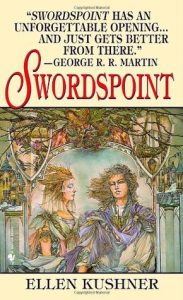Swordspoint by Ellen Kushner
 I’m a bit conflicted by Ellen Kushner’s Swordspoint. Having pondered it for a few days after finishing it, I’m putting it in the “liked it but didn’t quite love it” category.
I’m a bit conflicted by Ellen Kushner’s Swordspoint. Having pondered it for a few days after finishing it, I’m putting it in the “liked it but didn’t quite love it” category.
It’s a small and contained fantasy-of-manners, a heavily character-driven story of political intrigue and romance. There is no magic, no fantastical or supernatural elements to speak of, so it only lands in the fantasy genre by dint of its nobles-and-peasants setting and the prominent role of swordsmen in the social fabric of its society. Its scope is small and tight, with only two settings of note: the Hill where the nobles live, and the town of Riverside below it, home to a variety of lower class rabble. (I think the author made a conscious choice to limit the narrative focus only to a thin slice of the world’s characters and events.)
The writing is gorgeous. Kushner writes with a lovely, pastoral elegance that makes even mundane settings a joy to read about. Even when my interest in the story faltered, I was always happy to read the next sentence. She has a particular knack for finding just the right odd detail to focus her camera upon to both color a scene and deliver sparkling moments of characterization.
The characters of Swordspoint were both a strength and a weakness. On the one hand the main characters, the swordsman Richard St Vier and his lover Alec, were fascinating and well-drawn. Wanting to know what would become of St Vier was the main driver that propelled me through the book. But he was the only main character that was, to me, in any way likeable. Alec was rude and recklessly self-destructive, and the other characters were either clearly villainous or aimlessly self-absorbed. (There was a minor character, a retired Swordsman, who was sympathetic, but he didn’t get much page time.) Also, one of the POV characters never found a real place in the story, and had drifted away to an afterthought by the time the book came to an end.
The political intrigue was excellent and handled with a deft touch, but I was left feeling that despite the clever machinations and entertaining sword duels, there was little sense of stakes. Alec is aware of his own tendency to self-destruction, and St Vier comes right and out tells you he doesn’t expect to live long as a Swordsman. Since the protagonists didn’t seem to care if and when they were in danger, it was hard for me to care. And there’s nothing outside the story, no sense of the events fitting into a world larger than the political maneuvers of this one city.
I may be being unfair, faulting the author for things she consciously didn’t prioritize. And there’s a lot to like about the book. The dialogue is excellent and sprinkled liberally with humor; the role of swordsmen in society is fascinating; the intrigue falls nicely into the satisfying strata of “complex-but-not-byzantine”; the two main characters, whatever you may think of them, are fascinating to watch interact with those around them; and the romance is believable and handled well without needing to be explicit.
If you’re in the mood for something small, beautiful, and character-focused, without a need for high magic and epic quests, Swordspoint will fit the bill very well.

[…] Kushner. She wrote a novel called ‘Swordspoint’ which remains one of the finest fantasies I’ve ever read. I bet I’ve read it ten times. Do […]